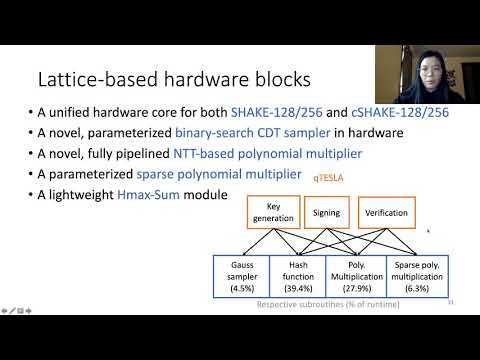CryptoDB
Parameterized Hardware Accelerators for Lattice-Based Cryptography and Their Application to the HW/SW Co-Design of qTESLA
| Authors: |
|
|---|---|
| Download: | |
| Presentation: | Slides |
| Abstract: | This paper presents a set of efficient and parameterized hardware accelerators that target post-quantum lattice-based cryptographic schemes, including a versatile cSHAKE core, a binary-search CDT-based Gaussian sampler, and a pipelined NTT-based polynomial multiplier, among others. Unlike much of prior work, the accelerators are fully open-sourced, are designed to be constant-time, and can be parameterized at compile-time to support different parameters without the need for re-writing the hardware implementation. These flexible, publicly-available accelerators are leveraged to demonstrate the first hardware-software co-design using RISC-V of the post-quantum lattice-based signature scheme qTESLA with provably secure parameters. In particular, this work demonstrates that the NIST’s Round 2 level 1 and level 3 qTESLA variants achieve over a 40-100x speedup for key generation, about a 10x speedup for signing, and about a 16x speedup for verification, compared to the baseline RISC-V software-only implementation. For instance, this corresponds to execution in 7.7, 34.4, and 7.8 milliseconds for key generation, signing, and verification, respectively, for qTESLA’s level 1 parameter set on an Artix-7 FPGA, demonstrating the feasibility of the scheme for embedded applications. |
Video from TCHES 2020
BibTeX
@article{tches-2020-30392,
title={Parameterized Hardware Accelerators for Lattice-Based Cryptography and Their Application to the HW/SW Co-Design of qTESLA},
journal={IACR Transactions on Cryptographic Hardware and Embedded Systems},
publisher={Ruhr-Universität Bochum},
volume={2020, Issue 3},
pages={269-306},
url={https://tches.iacr.org/index.php/TCHES/article/view/8591},
doi={10.13154/tches.v2020.i3.269-306},
author={Wen Wang and Shanquan Tian and Bernhard Jungk and Nina Bindel and Patrick Longa and Jakub Szefer},
year=2020
}

